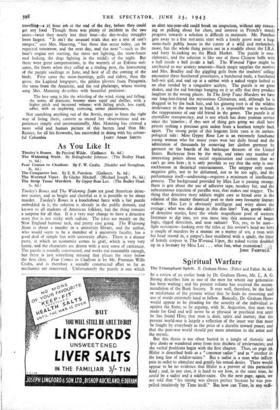Spiritual Warfare
The Triumphant Spirit. E. Graham Howe. (Faber and Faber. 8s. 6d .
IN a review of an earlier book by Dr. Graham Howe, Mr. L. A. G. Strong describes him as one of the men for whom our generation has been waiting ; and his present volume has received the. recom- mendation of the Book Society. It may well, therefore, be the fault or misfortune of the present writer that he finds its reasoning and use of words extremely hard to follow. Basically, Dr. Graham Howe would appear to be pleading for the sanctity of the individual as against the State; to be arguing, with St. Augustine, that man was made for God and will never be at physical or psychical rest until he has found Him; that man is dual, spirit and matter; that the present world-war is largely a reflection of the inner war that must be fought by everybody as the price of a durable inward peace; and that the post-war world should pay more attention to the artist and the mystic.
But this thesis is too often buried in a jungle of rhetoric and ipse dixits or wandered away from into thickets of irrelevancies; and the verbal problems begin with the first chapter. Thus, on page 29, Hider is described both as a "common sadist" and as "another in the long line of soldier-saints." But a sadist is a man who inflicts pain in order to stimulate and gratify his sexual desire. There would appear to be no evidence that Hitler is a pervert of this particular kind ' • and, in any case, it is hard to see how, at the same time, he could be a sadist and a soldier-saint. On the next page, again, we are told that " his timing was always perfect because he was pro- pelled intuitively by Time itself." But bow can Time, in any ordi-
nary sense of the word—as a measure, as duration, as a dimension— propel anything? Switching from all this, we are then given eight chapters describing patients suffering from different types of " depression," of which the book also purports to be a study; and since they bear such headings as " He was tender " and "She was tough," it must be assumed that they are intended for popular rather than scientific consumption.
These case-histories are followed, in an equally abrupt transition, by a chapter called The Holy Mountain," in which Dr. Graham Bowe expounds his private ontology. Man begins, he tells us, as spirit or as " an undifferentiated sexless angel," despatched or caused to " fall," by the Original Source or God, from heaven to earth. On the way, he meets with four walls or obstructions. .At the. first, if he is sufficiently ,patient, he discovers agate at which, in• exchange for a quarter of his " heavenly powers," he receives-the.faculty of knowing. At the second, for the loss of another quarter. of his.heavenly powers, he obtains the faculty of thinking. At the third, yielding up another quartenof his heavenly powers, he is granted the faculty of feeling. At the fourth, he receives his physical body and the-faculty of doing, loses the last of his heavenly powers, and is born a sinner. It would therefore appear, according to Dr. Graham Howes theory or allegory, that a baby can know, think, and feel before birth.
But this undifferentiated, -sexless angel—and apparently before re- ceiving the 'faculties of knowing, thinking, and feeling—is able to choose whether he will deal with.these obstructions or try and return to heaven. :Further, instead of the normal gate-hunting, bartering process, he may, though still presumably an undifferentiated sexless angel, be " one of those fiery-tempered men in whom anger rases when they meet obstruction," and -so he " blasts his way through the obstruction and destroys the wall." Whether, in .spite of this ante-natal violence, he -still receives the faculty of knowing and its successors, Dr. Graham Howe does not tell us. But" he will do
the same with -any wall he meets, this fiery, ill-tempered fellow, and will arrive on earth, like Lucifer or Hitler, with a flaming sword, with which he will try instantly, and in Gocrs name, to put the earth to rights." And if by instantly Dr. _Graham Howe really means instantly he must be.supposed to do so-in the midwife's arms. Others may perhaps find all this less chaotic. But it is typical, both in manner and content, of many subsequent pages ; and for one .reader, at any rate,,it imposes a rather severe.handicap on much in































 Previous page
Previous page